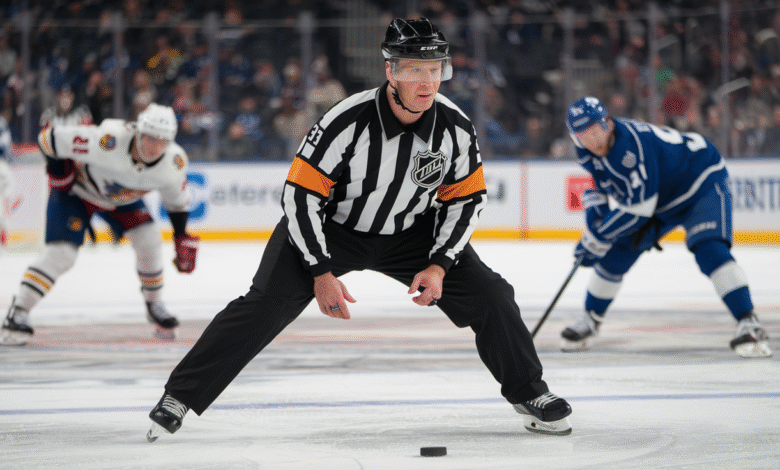How Much Do NHL Refs Make? Discover Their Surprising Salaries!

how much do nhl refs make is a question many hockey fans ask when they watch games on TV. These referees are in charge of keeping the game fair, calling penalties, and making fast decisions during high-speed action. People often think their job is simple, but it takes years of training, experience, and strong focus to become an NHL referee. They need to understand every rule perfectly and stay fit enough to skate with the fastest players on ice. NHL referees can earn a good salary, but the amount depends on experience, the number of games they officiate, and whether they work playoff matches. Beyond money, referees get travel opportunities and the thrill of being part of exciting hockey moments, which is something many love more than just the pay.
how much do nhl refs make is not only about base salaries. Entry-level referees in the NHL typically earn around $150,000 per season. As they gain experience, their pay can go up to $300,000 or more each year. Top referees who officiate big playoff games or the Stanley Cup Finals can make even higher amounts due to extra game fees and bonuses. NHL referees also get benefits like health insurance, retirement plans, and travel allowances, which make the job more secure and attractive. Their pay might seem high, but it matches the intense training, long hours, and pressure to make split-second decisions during games. Becoming an NHL referee is a career that combines love for hockey, skill, and dedication, and the pay reflects the responsibility they carry on ice.
how much do nhl refs make: Entry-Level vs. Experienced Referees
how much do nhl refs make depends a lot on their experience. New referees just starting in the NHL usually earn around $150,000 per season. They handle fewer games and learn how to manage high-speed play while making quick decisions. As referees gain experience, their pay rises because they officiate more important games and handle more responsibility. Experienced referees can earn up to $300,000 or more per year, especially if they work playoff matches or the Stanley Cup Finals. Their salaries reflect the skill, training, and focus required to stay on top of the fast-moving action on ice. This pay also comes with benefits like travel allowances and health insurance, which help referees enjoy a stable and rewarding career while keeping the game fair and exciting for players and fans.
Extra Pay for NHL Refs: Playoffs and Stanley Cup Games
NHL referees can earn extra money when they officiate playoff games or the Stanley Cup Finals. These high-profile matches are more intense, and the league rewards referees with additional fees. Playoff games test a referee’s skill, focus, and ability to handle pressure, which is why they get higher pay for these events. The better a referee performs and the more important the games they cover, the higher their overall earnings. This extra pay can add thousands of dollars to their annual income and sometimes push top referees’ salaries above $350,000 per year. Travel, overtime, and special assignments also contribute to extra earnings. The combination of base salary and additional pay shows how the NHL values skilled referees who help maintain fair play and keep fans engaged in every thrilling moment of the game.
How NHL Referee Salaries Compare to Other Sports Officials
Compared to referees in other professional sports, NHL officials earn competitive salaries. While NFL and NBA referees also earn high pay, NHL referees benefit from a balance of good base salaries and extra game fees. Entry-level referees in soccer or minor leagues earn much less, showing how NHL referees are well-compensated for their skill and responsibility. Their pay reflects the long hours of training, on-ice fitness, and mental focus needed to manage fast-paced hockey games. Over time, the combination of base salary, playoff bonuses, and perks makes the NHL referee career financially rewarding. This pay structure helps attract the most skilled officials and ensures the highest level of professionalism during games, keeping hockey exciting and fair for everyone.
Benefits and Perks: What NHL Refs Get Besides Money
NHL referees enjoy several perks beyond their salaries. They receive health insurance, retirement plans, travel allowances, and access to professional training programs. These benefits make the job secure and attractive, especially for referees who travel to many cities for games. Time off between games helps them rest and maintain peak performance. Some referees also get equipment allowances and professional development opportunities, helping them improve their skills. These extras show that the NHL values referees and understands the challenges of their job. Beyond money, referees enjoy the thrill of being part of exciting hockey moments and the respect of players, coaches, and fans. These perks make officiating in the NHL both rewarding and satisfying.
The Training Path to Becoming an NHL Referee
Becoming an NHL referee requires years of training, dedication, and experience. Most referees start at youth or amateur hockey levels and work their way up through minor leagues. They must master the rules of hockey, improve skating skills, and gain experience in high-pressure situations. Many NHL referees attend officiating camps and workshops to enhance their knowledge and performance. The journey can take several years, but it prepares referees to handle fast-paced NHL games confidently. Once in the NHL, referees continue training and receive feedback to improve their decision-making. This long training path shows why NHL referees earn the salaries they do, as their skills and dedication ensure fair and exciting gameplay.
How Travel and Game Schedule Affect NHL Referees’ Pay
NHL referees travel to many cities during the season, which affects their earnings and lifestyle. More games mean higher salaries, while long travel schedules can be tiring. Travel allowances, hotel stays, and meals help referees manage expenses while working away from home. The number of games and special assignments like playoffs directly influence how much do nhl refs make each year. Managing time, rest, and performance is crucial for referees to stay sharp and avoid mistakes during fast-paced games. Their busy schedule highlights the challenges of the profession and shows why the NHL pays referees well, balancing compensation with the demands of the job.
Top Factors That Influence how much do nhl refs make
Several factors determine how much do nhl refs make, including experience, number of games officiated, and the level of matches. Referees working playoff games or the Stanley Cup Finals earn higher pay. Performance, reputation, and skill level also play a role. Travel requirements and willingness to take on extra assignments can boost income. Benefits like health insurance, retirement, and allowances add value to the job. These combined factors ensure that referees who are highly skilled, dedicated, and reliable receive salaries that reflect the responsibility and intensity of their role in maintaining fair and exciting hockey games.
Conclusion
NHL referees earn good money because their job is hard and needs lots of skill. They work fast, make quick decisions, and keep the game fair for players. Pay depends on experience, games worked, and special matches like playoffs.
Besides money, NHL refs get benefits like health insurance, travel allowances, and retirement plans. Their career is exciting and rewarding, showing that hard work and dedication pay off.
FAQs
Q: How much do new NHL referees make?
A: Entry-level NHL referees earn around $150,000 per season.
Q: Can NHL referees earn more during playoffs?
A: Yes, playoff and Stanley Cup games come with extra pay.
Q: Do NHL referees get benefits?
A: Yes, they get health insurance, travel allowances, and retirement plans.
Q: How long does it take to become an NHL referee?
A: Most referees train for years in minor leagues before joining the NHL.
Q: Do experienced NHL referees earn a lot more?
A: Yes, experienced referees can earn $300,000+ per season with extra game fees.



